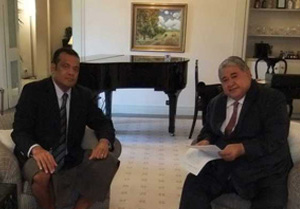
Mata’afa Keni Lesa
EDITORIAL: APIA: Prime Minister Tuilaepa Sa’ilele Malielegaoi can be accused of many things but not for the lack of courage to tackle a challenge head on.
As most Pacific leaders duck for cover in the escalating war of words between fugitive Colonel Ratu Tevita Mara and his gun-totting leader Frank Bainimarama, Tuilaepa has emerged as the Pacific’s voice of reason by speaking up in support of the fugitive.
And he’s done more than just support him; he’s welcomed him to Samoa.
In Australia, Tuilaepa’s comments dominated world headlines yesterday. It cleverly points to him as a leader with courage.
And rightly so. Tuilaepa’s views about Fiji are well known. If anything, he’s been the only Pacific leader bold enough to take on the military commander from a distance.
And his views in Australia this week are hardly surprising.
“I have been talking a lot about the situation in Fiji and I still believe that the Fijians will eventually solve the problem and I think this is one of the processes towards that solution,” he says of Colonel Mara’s escape.
“What I hear from Tevita seems to suggest that as it happens in dictatorships, eventually common sense will prevail and people be keen to realise that they have to solve their own problems themselves.”
'Common sense'
The “common sense” Tuilaepa talks about refers to people having had enough of their leader to the point they are willing to stand up and take them on.
The Prime Minister says this has happened in countries like Vietnam and Indonesia.
“Eventually people will come to realise that the dictatorship was wrong and I do hope that they will solve it peacefully one way or another,” says the Prime Minister.
And to show he is serious about helping Fiji, Tuilaepa took time from his busy tour of Australia to meet the Colonel.
Says Tuilaepa: “He (Colonel Mara) told me that they are canvassing for a very simple plan for a return to democracy in his country.
“I tend to look at the defection [from the Fiji military] and the proactive role he is playing now as part of the process of a solution initiated by the Fijians themselves.”
But he warns the process could take a while.
“For us, the process of mending differences is a long-term process and part of the Pacific ‘way’ is to talk and talk and talk. We like talking and we talk our problems over.”
Whether Bainimarama will agree is another story.
By meeting with Colonel Mara, Tuilaepa has sent Bainimarama a very clear message. That is, Samoa doesn’t really care what he thinks, this country will support whatever efforts are there to restore democracy in Fiji.
Tuilaepa's 'endorsement'
Indirectly, Tuilaepa’s endorsement of Colonel Mara’s rebellious attitude towards Bainimarama is being heralded, as the sort of action the people of Fiji should take.
And that’s not all. Tuilaepa wants to take it further.
Instead of lifting the sanctions imposed by New Zealand and Australia, he has called for additional ones.
“The reason is so that once the people realise that the sanctions are making their lives difficult, then it will motivate them to take the necessary action,” he says.
Once again, Tuilaepa is urging Fijians to act.
How so? He doesn’t say.
But you don’t need to be a rocket scientist to put figure it out.
The question is, what if the “necessary action” means the people of Fiji will have to strike out against the military? If that happens, who will be responsible for the lives that are likely to be affected?
The point is, what Tuilaepa is saying is potentially deadly.
And in a country where the military has shown it doesn’t care about what others think – including Tuilaepa - we can only look on and feel for the Fijians.
It’s easier said than done.
Pacific Scoop report



